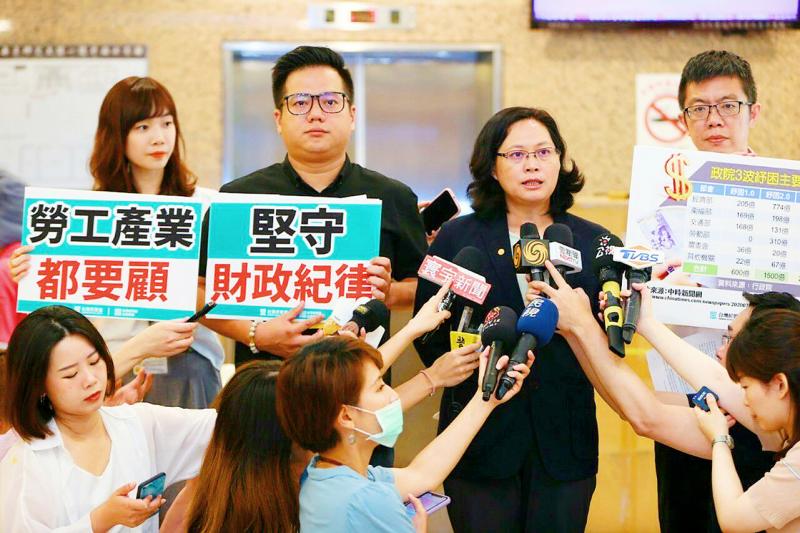Premier Su Tseng-chang (蘇貞昌) yesterday defended the high cost of the government’s Triple Stimulus Vouchers in response to criticism that it had breached expenditure rules in appropriating from other budgets to pay for the program.
The Directorate-General of Budget, Accounting and Statistics (DGBAS) on Thursday told a news conference that the voucher program, which began on Wednesday last week, cost the nation NT$51.1 billion (US$1.73 billion) — far more than the government’s initial NT$2.3 billion estimate.
The government had run a deficit of NT$38.2 billion to issue the vouchers, which is to be offset by a second NT$210 billion special budget proposed by the Executive Yuan, the DGBAS said.

Photo: Chen Yun, Taipei Times
The announcement drew criticism from Taiwan People’s Party (TPP) legislators, who yesterday held a news conference accusing the government of spending taxpayers’ money without legislative approval.
The lawmakers said that the Executive Yuan breached financial procedures, and then expects the opposition to stomach its budget proposal.
However, Su said that as the COVID-19 pandemic continues in other countries, the nation is experiencing a period of economic recovery, and people can go shopping, which should be attributed to the collaborative effort of government agencies.
Just as it did to contain the virus, the government has also adopted a proactive approach to revitalizing the economy, which has benefited 12 million people since the Legislative Yuan in March approved the special budget, he said.
The Special Act on COVID-19 Prevention, Relief and Recovery (嚴重特殊傳染性肺炎防治及紓困振興特別條例) allows agencies to tap its budget or the budgets of other agencies to carry out disease prevention or economic stimulus with the Executive Yuan’s approval, Su said.
The advance payment for the vouchers was decided to best serve the public interest, he added.
In related news, a poll released yesterday by the Chinese Nationalist Party’s (KMT) National Policy Research Foundation showed that almost 50 percent of respondents believed that the Triple Stimulus Vouchers are ineffective in revitalizing the economy.
The foundation said that the results show that the Democratic Progressive Party needs to propose another special budget to boost the economy.
The various digital vouchers that have been issued by government agencies are a way to distract from a gloomy economic outlook, the foundation said.
The foundation was referring to vouchers issued by several government agencies, including the Ministry of Economic Affairs’ “Arts FUN Go” vouchers and the Council of Agriculture’s vouchers to encourage people to visit and shop at recreational farms, as well as the Sports Administration’s vouchers to encourage people to attend events or purchase sports gear.
The survey also found that 63 percent of people are pessimistic about the economy, while 71 percent believe that the actual number of furloughed people is higher than the figures published by the Ministry of Labor.
The poll was conducted from Tuesday to Thursday last week, and collected 1,077 valid samples. It had a margin of error of 2.99 percentage points.
Additional reporting by Shih Hsiao-Kuang

The Ministry of Economic Affairs has fined Taobao NT$1.2 million (US$36,912) for advertisements that exceed its approved business scope, requiring the Chinese e-commerce platform to make corrections in the first half of this year or its license may be revoked. Lawmakers have called for stricter enforcement of Chinese e-commerce platforms and measures to prevent China from laundering its goods through Taiwan in response to US President Donald Trump’s heavy tariffs on China. The Legislative Yuan’s Finance Committee met today to discuss policies to prevent China from dumping goods in Taiwan, inviting government agencies to report. Democratic Progressive Party Legislator Kuo Kuo-wen (郭國文) said

The Ministry of Economic Affairs has fined Taobao NT$1.2 million (US$36,900) for advertisements that exceeded its approved business scope and ordered the Chinese e-commerce platform to make corrections in the first half of this year or its license would be revoked. Lawmakers have called for stricter supervision of Chinese e-commerce platforms and more stringent measures to prevent China from laundering its goods through Taiwan as US President Donald Trump’s administration cracks down on origin laundering. The legislature’s Finance Committee yesterday met to discuss policies to prevent China from dumping goods in Taiwan, inviting government agencies to report on the matter. Democratic Progressive Party

Taiwan and its Pacific ally Tuvalu on Tuesday signed two accords aimed at facilitating bilateral cooperation on labor affairs, according to Taiwan’s Ministry of Foreign Affairs (MOFA). The governments inked two agreements in Taipei, witnessed by Foreign Minister Lin Chia-lung (林佳龍) and visiting Deputy Tuvaluan Prime Minister Panapasi Nelesone, MOFA said in a news release. According to MOFA, the agreements will facilitate cooperation on labor issues and allow the two sides to mutually recognize seafarers’ certificates and related training. Taiwan would also continue to collaborate with Tuvalu across various fields to promote economic prosperity as well as the well-being of their

Sung Chien-liang (宋建樑), who led efforts to recall Democratic Progressive Party (DPP) Legislator Lee Kun-cheng (李坤城), was released on bail of NT$80,000 today amid outcry over his decision to wear a Nazi armband to questioning the night before. Sung arrived at the New Taipei District Prosecutors’ Office for questioning in a recall petition forgery case last night wearing a red armband bearing a swastika, carrying a copy of Adolf Hitler’s Mein Kampf and giving a Nazi salute. Sung left the building at 1:15am without the armband and covering the book with his coat. Lee said today that this is a serious